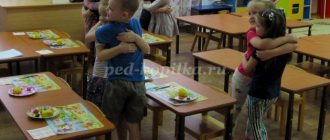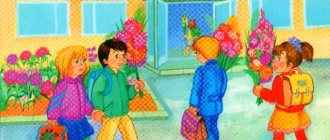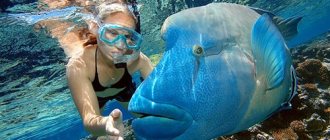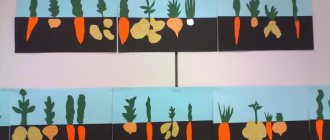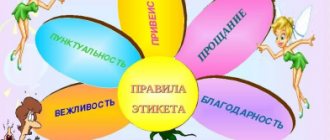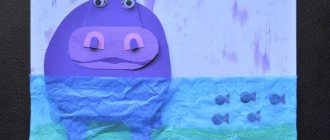Literary game based on the works of Bianchi, grades 2-4. Abstract
Summary of the game based on the work of Vitaly Bianchi
Literary intellectual game based on the works of Vitaly Bianki
Author: Tatyana Aleksandrovna Tolstikova Position: teacher, State Budgetary Educational Institution NAO "NSHI", Naryan-Mar Description: I bring to your attention a literary game for elementary school students. The material may be of interest to teachers of grades 2-4 for conducting events on the work of V. Bianchi. Goal: consolidation of knowledge on the works of Vitaly Bianchi Objectives: cultivate love and respect for animals, develop the need for reading, develop teamwork skills, develop thinking, attention, memory. Preliminary work: reading stories and fairy tales by V. Bianchi, listening to stories in audio recordings, watching filmstrips on the writer’s work, drawing from the works. We can recommend reading exactly those works that were used in the event. Design: portrait of the writer, children's drawings, book exhibition.
Progress of the game.
For the game, children are divided into teams of no more than 5 people.
Teacher: Hello, guys! Today we have an unusual event, where we will once again meet the heroes of Vitaly Bianchi’s works. During the lessons you got acquainted not only with the biography of the writer, but also with some of his works. You borrowed many interesting books by this author from the library. We also looked at filmstrips based on his stories and fairy tales. What did Vitaly Bianchi write his books about? Children: About nature. About animals. Teacher: Vitaly Bianki loved nature and all its inhabitants very much. What do this author’s books teach us? Children: Take care of nature, help animals, take care of them.
Teacher: Guys, I am sure that after getting acquainted with the work of Vitaly Bianchi and his heroes, you have become kinder, learned to appreciate nature and will always come to the aid of an animal in need. And today you will have the opportunity to show your knowledge of the work of this writer by taking part in a literary game, which will be held in the form of a competition between teams. I wish you good luck, and remember that only a friendly team can achieve success!
Competition "Hungarian Crossword"
Teacher: Here is a Hungarian crossword (filword). All the insects hid here and helped the ant get home. Nearby are cards with images of these insects. You need to find the names of all insects in the crossword puzzle grid, and arrange the cards in the order in which these insects met and helped the ant.
Answers:
Competition “Unexpected Meeting”
Teacher: The heroes of two fairy tales by Vitaly Bianchi met together. Help each hero find his fairy tale. What kind of fairy tales are these? Who is the hero of both fairy tales? Place this card between two groups of cards. Cards: squirrel, woodpecker, cow, marten, fox, bear, fly, deer, bees, crayfish, fish, starling, slug, owl Answer:
Competition “Physical Minutes”
Teacher: Now we will go for a walk with the puppy from Bianca’s story “The First Hunt”. I will tell you affirmations. If you agree with me, clap overhead, if not, squat, hugging your knees. Do you believe that the puppy was chasing chickens and geese around the yard? (No, only ducks, he was running away from geese) Do you believe it? What did the hoopoe want to surprise him with? (Yes) Do you believe that the whirligig wanted to scare him? (Yes) Do you believe that the bittern wanted to play a joke on him? (No, she wanted to deceive him) Do you believe that the caterpillars, butterflies and grasshoppers wanted to hide from him? (Yes) Do you believe that the bombardier beetle wanted to bite him? (No, he wanted to drive him away)
Competition “Rebuses”
Teacher: Guys, here are puzzles in front of you, in which the names of birds are encrypted. You need to decipher them and remember the names of the story by Vitaly Bianchi from which they came to us. Answer: swallow, dove, plover, falcon, oriole, warbler, chemga - “Forest houses”
Competition "African Crossword"
Teacher: Guys, here is an African crossword puzzle. You need to cross out the same letters in each line and in each column. From the remaining letters you will read the name of the dog to which our next competition will be dedicated. Answer
Quiz Competition
Teacher: In this competition, each player will independently defend his team.
You take turns going to the tables with signal cards from 1 to 4. I will read you a question and 4 answer options. You must pick up the card number with the correct answer. Where was Latka’s spot, like a patch? 1. On the eye 2. On the nose 3. On the chest 4. On the forehead What breed was Latka? 1. German 2. Spanish 3. Russian 4. She was mongrel What did Latka bring to Tanya instead of the lost low shoe? 1. Slippers 2. Boot top 3. Stick 4. Rag How many ducklings did the reed patch bring? 1. 1 2. 5 3. 6 4. They were goslings. What animal were Tanya and the boys afraid of meeting in the forest? 1. Wolf 2. Bear 3. Neighbor's dogs 4. We weren't afraid of anyone Competition "Essay"
Teacher: After getting acquainted with the story "Mouse Peak", the children were asked to write an essay with a summary of the story. The student was very inattentive and handed in the following essay to the teacher: Peak built himself a pantry for food supplies, but then a fox almost caught up with him. Peak ran away from her and met the frog, but immediately fell into a mousetrap. The mouse escaped from it and found himself on a desert island, where an osprey fisherman capsized the boat in which Peak was sailing. The mouse fell into hibernation out of grief and the shrike-shrike painfully hit him in the back with its beak. Then Peak went on a boat trip and made friends with the children. But then a long-eared forest owl grabbed him with its claws, and the slug smeared the mouse’s home with nasty mucus. Only the invisible fur saved Piku's life. The mice did not accept Peak into their family, and the goats ate all of Peak’s supplies, and a bumblebee army attacked Peak. Teacher: You need to correct this essay, and arrange the cards with the adventures of the mouse in the correct sequence. You can use the book to complete this task. The ability to work in a team will greatly help you here.
Answer: 1. Went on a boat trip. 2. An osprey fisherman capsized the boat in which Pieck was sailing. 3. Peak met a frog. 4. The invisible fur saved Piku’s life. 5. The Shrike painfully hit Peak in the back with its beak. 6. A bumblebee army attacked Peak. 7. Peak found himself on a desert island. 8. The slug smeared the mouse’s home with nasty slime. 9. Peak built himself a pantry for food supplies. 10. The peak went into hibernation. 11. The goats ate all of Peak's supplies. 12. A long-eared forest owl grabbed the pike with its talons. 13. The fox almost caught up with the mouse. 14. The mice did not accept Peak into their family. 15. Peak fell into a mousetrap. 16. Peak made friends with the children. Teacher: Guys, this is where our competition ends. But I think your acquaintance with the work of Vitaly Bianchi will not end there. Read his stories, and you will learn a lot more new and interesting things about nature and its inhabitants. Summarizing.
We recommend watching:
Literary game based on Pushkin's fairy tales in elementary school Literary - intellectual game 2-3 grades. Scenario Literary game based on Nosov’s book “The Adventures of Dunno and His Friends”, grades 3-4 Literary quiz game with answers based on the fairy tale: The Snow Queen, grades 4-5
Similar articles:
Literary game “Heavyweight” based on A. Serafimovich’s story “Three Friends” for elementary school students
Literary game for 3rd grade
The game is a journey for elementary school based on Andersen’s fairy tale “The Wild Geese”
Lapbook "V. V. Bianki"
Galina Nekrasova
Lapbook “V. V. Bianki"
The teaching aid is a cardboard folder in A3 format. On the pages of the folder there are various pockets in which information on the topic is collected.
Didactic manual " Lapbook "
Intended for children of middle and senior preschool age, the content
of the lapbook can be expanded and complicated. At senior preschool age, children can already participate in collecting material together with adults: analyze, sort information.
This manual is a means of developmental learning and involves the use of modern technologies: technologies for organizing collective creative activities, communication technologies, technology for project activities, gaming technologies.
Goal: development of children’s cognitive abilities through educational tasks and games
1. Strengthen children’s ideas about the writer’s work
2. Develop children's thinking, speech, imagination, memory
3. Develop children's interest in fiction.
4. Develop in children a desire to perform joint play tasks
The content includes: didactic games based on the works of V. V. Bianchi ; speech material: riddles, illustrations; CD with bird sounds
A dramatization of the fairy tale by V. Bianchi “The Owl” As part of the project “Drink, children, milk,” the children of the senior group and I decided to show the kids the fairy tale by V. Bianchi “The Owl.” First, we learned the words. Interactive folder (lapbook) “Dandelion” Today I want to tell you about the project activities in our group. In May, our group prepared and implemented the project “Wears. How we studied the work of V. Bianchi We spent a whole month working on the project “Studying the work of V. Bianchi.” A huge amount of work has been done. I just want to share what we are.
KVN “Forest paths of V. Bianki” KVN “Forest paths of V. Bianki”. Educators: Postnikova L.V., Kurbatova E.N. Goals, objectives: to introduce children to life and.
Project “Acquaintance with the work of V. Bianchi” Relevance of the project: Environmental education is a new direction in preschool pedagogy. The process of interaction between a child and a plant.
Complex lesson based on the fairy tale “The Fox and the Little Mouse” by V. Bianchi Type of lesson: complex Types of children’s activities: play, communication, cognitive-research, productive, perception. Thematic folder (lapbook) “These funny wild animals” In connection with the implementation of the Federal State Educational Standard for preschool education, every teacher is looking for new approaches and ideas in their teaching activities. So I started.
Ecological lesson based on the book “Mouse Peak” by V. Bianchi It is very important to read the book with children, discuss it and reflect on it. Conversation-analysis based on the story “Mouse Peak” by V. Bianchi. (preparatory
Source
